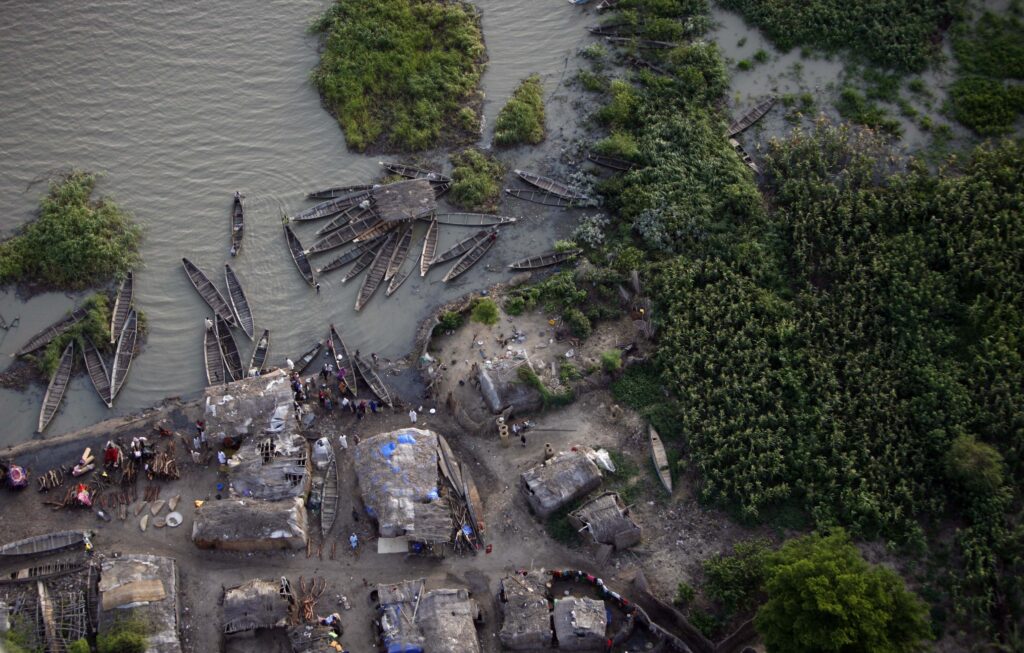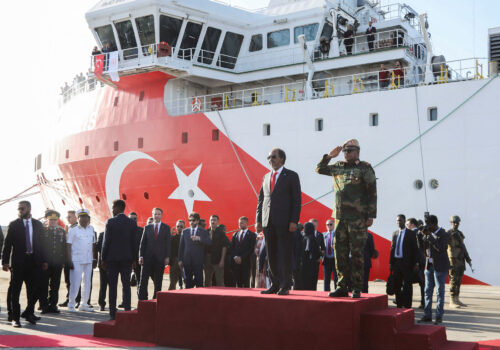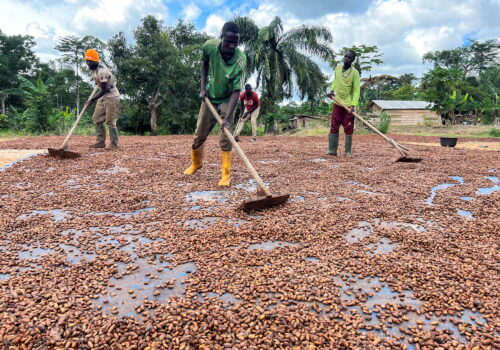The Lake Chad Basin, stretching across parts of Nigeria, Niger, Chad, Cameroon, and the Central African Republic, has long been a hotspot of insecurity. In recent months, that insecurity has intensified further, as Boko Haram and affiliated jihadist factions have launched a renewed offensive against military forces. This development could trigger greater chaos and prevent the basin from turning its natural wealth into a peace dividend for years to come.
In June 2024, coordinated suicide attacks in Nigeria’s Borno State struck a wedding, a hospital, and a funeral within hours, killing more than thirty people and wounding over one hundred. Months later, militants overran a garrison in Chad, killing more than forty soldiers, demonstrating the insurgency’s ability to operate across borders.
In 2025, violence has escalated further. Bombings and improvised explosive devices tore through markets and roads in Borno: one July attack killed more than ten people, while another at a fish market claimed at least twelve lives. Analysts warn that Boko Haram and its offshoot, the Islamic State West Africa Province, may be undertaking a broader tactical reset—including renewed use of armed drones and roadside mines.
Fatalities near record highs
Across the basin, fatalities tied to militant Islamist groups hover near record highs. The Africa Center for Strategic Studies estimates nearly four thousand deaths over the past year, with new hotspots in Cameroon’s Far North. Humanitarian needs remain staggering, even as displacement has dipped slightly: as of May 2025, more than 2.9 million people were still displaced across the basin.
One pattern has proven consistent over time: military force alone cannot defeat a movement fueled by governance failures, economic exclusion, and security-force abuses. To their credit, regional governments have been recalibrating their responses.
The Multinational Joint Task Force (MNJTF) has demonstrated that joint, intelligence-driven operations can exact real costs on militants. In 2024, Operation Lake Sanity II destroyed camps in the region, neutralizing dozens of fighters, while coordinating air and ground actions across sectors—precisely the kind of cross‑border pressure the insurgents fear most.
The African Union’s Peace and Security Council has sought to align these operations with the Lake Chad Basin Commission’s Regional Stabilization Strategy. At the same time, the UNDP-managed Regional Stabilization Facility launched a four-year phase to fund rapid, visible rehabilitation in liberated hubs.
Yet the basin’s security architecture is fragile. In April, Niger’s junta announced its withdrawal from the MNJTF to focus resources on protecting oil infrastructure. Whether a formal withdrawal has taken place remains unclear, but this episode illustrates how diplomatic tensions, national politics, and energy priorities can disrupt longtime cross-border routines.
The resource paradox
Security is only one half of the ledger. The other is an economic paradox: the Lake Chad countries are rich in hydrocarbons and minerals, yet governance weaknesses hinder their wealth from being transformed into opportunity or legitimacy.
Nigeria holds Africa’s largest natural‑gas reserves and is a top oil producer, but years of underinvestment, theft, and opaque contracting have eroded both its economic impact and public confidence. Cameroon is pushing to revive upstream and downstream activities—including a long-planned overhaul of its national oil refining company (SONARA)—while eyes turn to gas-to-power and storage investments that could anchor industrial growth if policy risks are managed carefully.
Niger, known for its high‑grade uranium, has also become an oil exporter through a nearly two-thousand‑kilometer pipeline to Benin. Despite diplomatic spats and sabotage last year, shipments resumed in August 2024, and the corridor now sits at the intersection of energy and politics. Chad, for its part, remains tied to the Chad–Cameroon export system that once carried the promise of a model corridor for development—and the cautionary tale of how social safeguards can fray without sustained transparency.
Why hasn’t all this resource potential translated into security and shared prosperity? Because governance is failing.
Governance failures feed insecurity
The latest Transparency International index scores Nigeria, Cameroon, Chad, and Niger among the world’s most challenging environments for transparent governance and accountable public spending. Sector‑specific governance is equally uneven.
On paper, Nigeria’s 2021 Petroleum Industry Act offers a pathway to streamline the industry and share benefits with host communities. However, the broader oil-and-gas governance score remains classified as “weak,” with licensing transparency a persistent issue that discourages responsible investment. In practice, corruption and predation squander revenue and fuel insecurity, reinforcing insurgent claims that the state extracts resources while communities are left to suffer.
At the rural margins, citizens face corruption and insurgent “taxation,” which erodes trust and cooperation. Addressing this issue requires linking security, governance, and economic recovery through targeted operations paired with rapid stabilization: repairing infrastructure, restoring services, supporting livelihoods, and building accountable community security forces integrated into professional policing.
What real stabilization requires
Stabilization efforts should align with the Lake Chad Basin Commission’s strategy and be scaled through UNDP funding to turn military gains into trust. Resource development must adhere to strict transparency, requiring community consent, open contracts, shared revenues for local infrastructure, and genuine job creation. The Africa Mining Vision offers a framework for equitable, community-driven benefits—and it should become the standard for foreign‑backed deals in the basin.
Foreign partners should welcome this clarity. Partnerships—whether for offshore oil blocks, uranium concessions, or pipeline rights—must transfer technology, build local supply chains, and co‑finance community assets. This governance‑first approach serves both as development policy and a security strategy: when contracts are transparent, new pipelines fund local clinics and roads, and jobs are allocated to qualified locals, militants lose their recruiting fuel.
Trust as the ultimate security
Leaders must ground counterinsurgency in transparent, mutually beneficial economic deals. Despite persistent violence, governments have demonstrated their ability to coordinate effectively, and communities have proven resilient, with markets and farms sustaining life amid conflict.
The region’s resource base is real: oil and gas in Nigeria and Cameroon, uranium and oil in Niger, and a regional pipeline network that could become a development corridor—rather than a grievance machine—if managed effectively. The decision is ultimately political. Double down on short-term force and opaque resource deals, and violence will continue to adapt while the development window narrows. Or tackle the roots of conflict and build a transparent partnership that puts citizens first.
Only the latter can transform Lake Chad’s natural wealth into durable security—and offers the potential to outpace an insurgency that has finally learned to survive.
Stabilizing the Lake Chad Basin is fundamentally about trust. Building trust—through state protection, transparent contracts, and fair partnerships—is the only way to turn the basin’s crisis into an opportunity. If regional leaders commit now, alongside citizens who can hold them accountable, they can match insurgents’ adaptability and steer the region toward peace and prosperity.
Jude Mutah is a policy expert with extensive experience in Africa and holds a doctorate in Public Administration from the School of Public and International Affairs at the University of Baltimore. He has worked with the United States Institute of Peace and the National Endowment for Democracy.

The Africa Center works to promote dynamic geopolitical partnerships with African states and to redirect US and European policy priorities toward strengthening security and bolstering economic growth and prosperity on the continent.
Further reading
Wed, Sep 10, 2025
To counter Chinese and Russian influence in Africa, Turkey could be a decisive ally for the US and Europe
AfricaSource By Rama Yade, Defne Arslan
As Turkey continues to develop closer ties to African nations, the United States and Europe should work with Turkey as a partner in its efforts to gain soft power throughout the continent.
Fri, Aug 15, 2025
Cameroon could bridge the gap in US cocoa and timber imports
AfricaSource By
As cocoa prices surge and timber demand grows, Cameroon stands out as a strategic trade partner. US firms and policymakers have yet to fully seize the opportunity.
Thu, Aug 14, 2025
Biased credit ratings are costing Africa billions—and worsening its health crises
AfricaSource By
As debt payments outpace spending on health and education, African leaders are renewing calls to overhaul a credit ratings system they say punishes reform and deepens fragility. Zambia is a case in point.
Image: Long boats parked at Lake Chad edge near the Chad capital N'Djamena. Source: REUTERS/ Zohra Bensemra.



